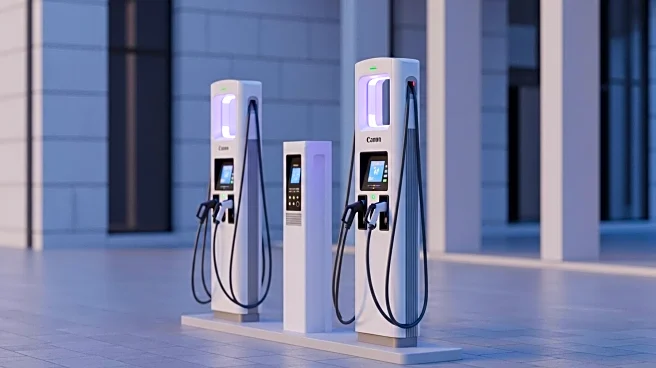What's Happening?
The U.S. electric vehicle (EV) market is facing significant challenges following the end of a federal tax credit that provided up to $7,500 for certain EV purchases. This change, coupled with new tariffs, is expected to slow down the momentum in EV sales. Automakers like Tesla and General Motors have reported record electric sales recently, but anticipate a decline in demand due to the removal of these incentives. Hyundai has responded by lowering prices for its Ioniq EVs, while Tesla plans to increase monthly lease payments for some models. Analysts suggest that the U.S. is lagging behind other countries in EV adoption, partly due to weaker government support compared to regions like Europe and China.
Why It's Important?
The removal of the federal EV tax credit and the introduction of tariffs could have a profound impact on the U.S. automotive industry. The tax credit was a crucial factor in promoting EV adoption, and its absence may lead to reduced investments in EV technology. This shift could affect U.S. competitiveness in the global EV market, where countries like China and the UK are advancing rapidly. The changes may also influence consumer behavior, as higher prices could deter potential buyers, impacting overall car sales and the transition to sustainable transportation solutions.
What's Next?
Automakers are expected to adjust their pricing strategies in response to these policy changes. Hyundai has already announced price reductions for its EVs, but other manufacturers may struggle to follow suit due to tariff pressures. The industry will closely monitor consumer reactions and sales trends to determine future strategies. Additionally, political leaders and industry stakeholders may engage in discussions to address the competitive challenges posed by international markets and explore alternative incentives to support EV adoption.
Beyond the Headlines
The policy changes highlight broader ethical and environmental considerations. The shift away from government incentives raises questions about the role of public policy in promoting sustainable technologies. It also underscores the tension between economic interests and environmental goals, as the U.S. navigates its position in the global transition to cleaner energy solutions. Long-term, these developments could influence regulatory approaches and the balance between market-driven and policy-driven advancements in the automotive sector.










